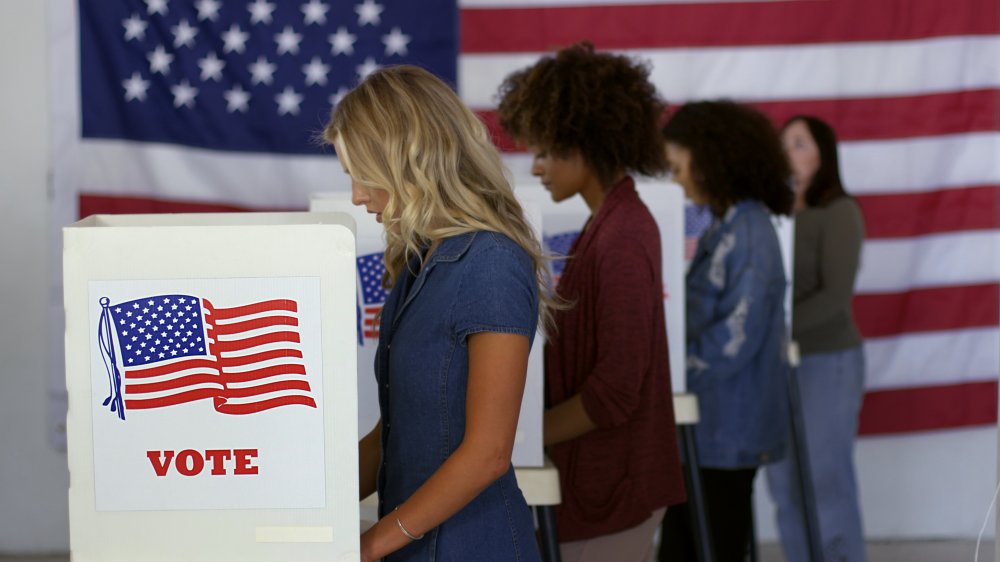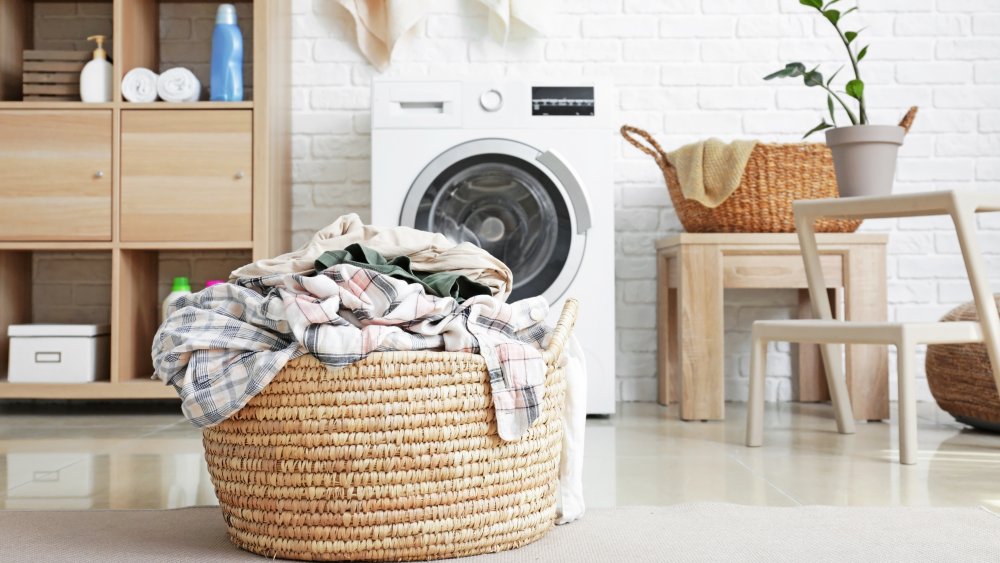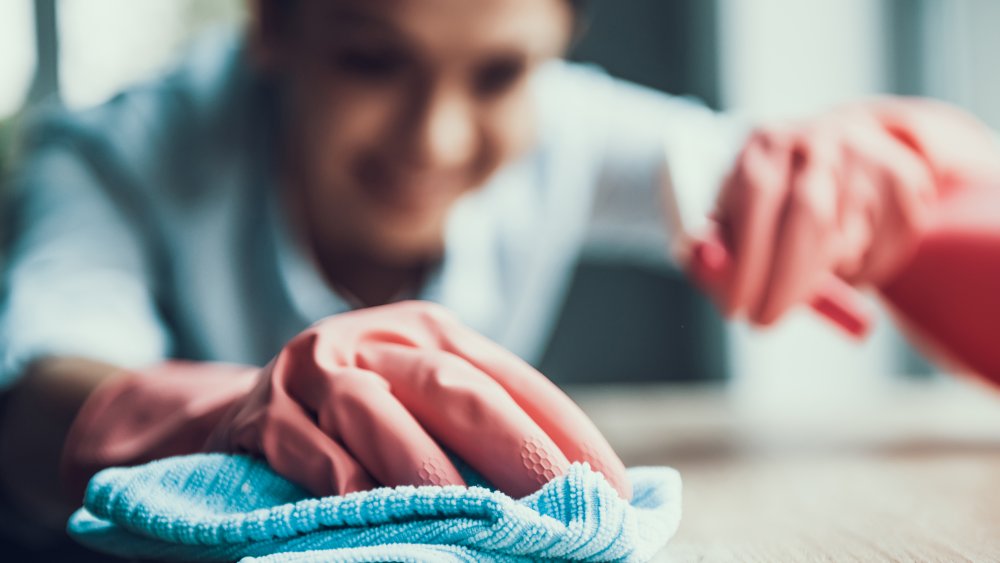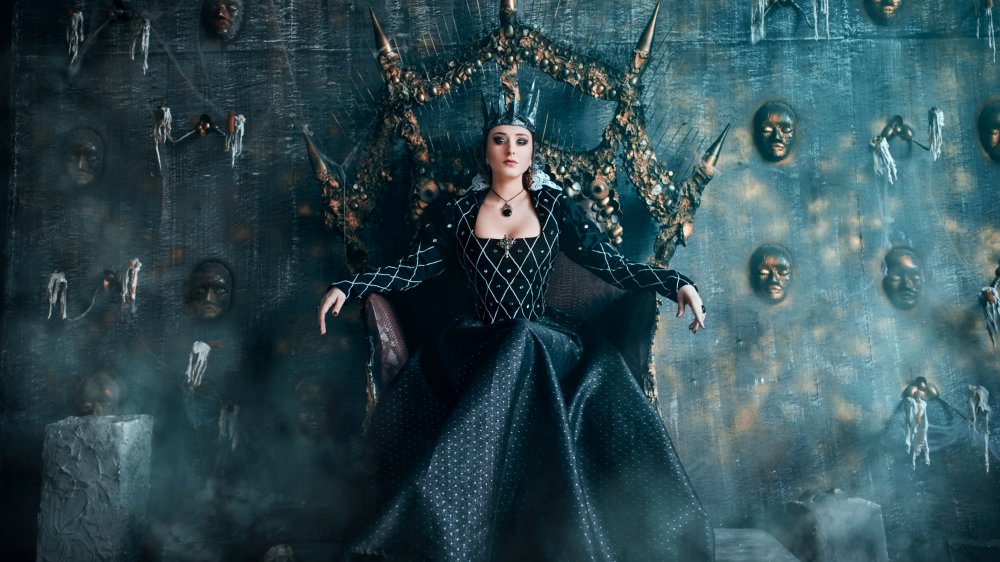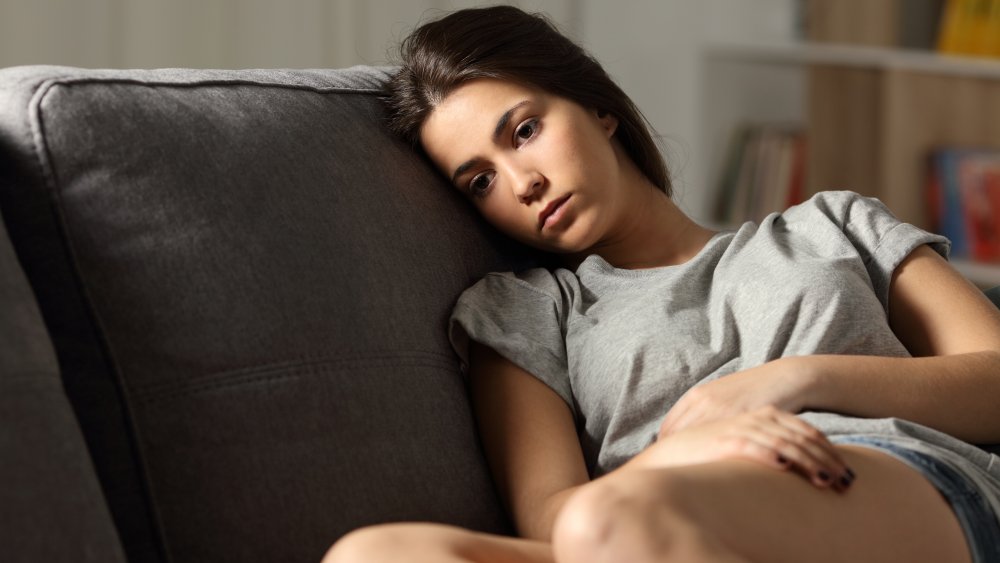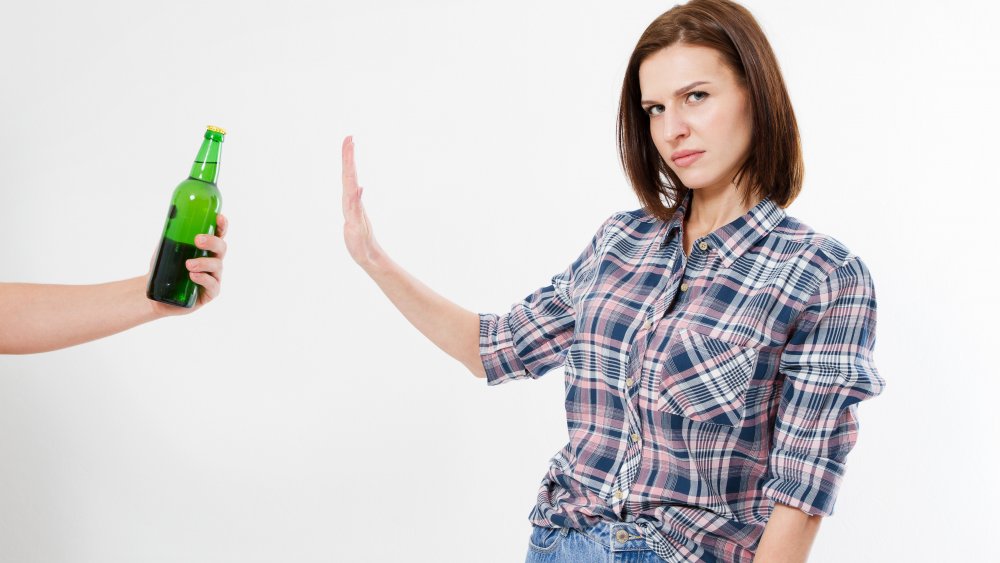The Craziest Reasons Women Were Denied The Right To Vote
It took women a long, long time to earn the right to vote. According to History, the women's suffrage movement started way back in ye olde days of the 1820s — about the same time most states made allowances to give all men, regardless of wealth or standing, the right to vote. (Their race could still be disqualifying, however.)
But women? Not so much. Historians now call that era's ideas of what a woman should be and how she should act the "Cult of True Womanhood." Basically? Stay home, cook, clean, spit out some kids, then worry only about turning those kids into good citizens and keeping your husband's slippers at the ready.
But women were starting to say, "Thanks, but no thanks, get your own darn slippers." By the end of the 19th century, some states — like Utah and Idaho — were allowing women to vote, but it wasn't until 1920 that it made it into the Constitution. And during that century, there were some pretty weird reasons given for why the polls were no place for a woman.
She'll start neglecting her children and home
In 1911, the Chairman of the Democratic Caucus, J.B. Sanford, wrote an "Argument Against Women's Suffrage," and it's... well, it's something. He starts out by saying "Politics is no place for a women (sic) consequently the privilege should not be granted to her," and then goes on from there. The term "women," it turns out, means the exact same thing as the word "mothers," and those people? They're needed at home raising the babies, not "gadding the streets and neglecting her children. [...] keeping in their places and attending to those duties that God Almighty intended for them."
Well, then. He goes on to say that women don't need to be able to vote to "receive the protection of man," who's off doing things like fighting in wars and voting, all to keep his woman safe at home. If she decides she's going to go out and do something outside the house, it's clear that Sanford thought all heck was going to break loose. He writes that children will be abandoned to grow up however they please, divorces and broken homes will become the norm, and crime is going to rise, because all those babies born to voting moms? Criminals, the lot of 'em!
He wrapped up with: "keep woman where she belongs."
Too much thinking leads to infertility
Quick, what's the point of women? If you answered, "To have kids, of course!" then congratulations, you're right in line with some early 20th-century thinking.
According to The Atlantic, one of the prevailing medical theories of the early 1900s was that the human body only had so much energy in it, and everyone needed to be careful about how they spent it. While men could definitely go out and vote, fight in wars, and do things like think, women needed to preserve their energy for something else: childbearing. There was a certain type of person who firmly believed that if women started being allowed out of the home to do crazy things like voting and all the thinking that went along with it, then all that energy would be taken away from their reproductive systems and their womanly bits would atrophy.
Those orders came from the top, too. William T. Sedgwick was one of the founders of the Harvard School of Public Health, and he was the head of MIT's Department of Natural History (later, the Department of Biology). And he was the one who wrote, "We must not forget pregnancy and lactation, both of which are a great strain on a mother's vitality. Any further strain, like the responsibilities of the suffrage, is bound to be harmful to both mother and child." Science was different back then.
Women's inferior brains can't handle something so complicated
Voting is a huge responsibility, the argument went, and women? Well, they just weren't cut out to handle all that reasoning.
Cheryl Jorgensen-Earp is a professor at the University of Lynchburg, and she says (via The Atlantic) that one of the reasons women were denied the right to vote for a long time is that mainstream science taught that women's brains just couldn't handle complicated, deep thinking — like deciding who you're going to vote for, and being able to understand what issues were up for debate.
The anti-suffrage movement made fun of women's ability to think — like, a lot — asking people whether or not they'd entrust the future of the country to someone who only had room in their head for what they thought was important: and that was limited to things like puppies, kittens, chocolate, and cute young men. With all those puppies and kittens running around in there, there just wasn't room for anything else.
It's not going to get rid of original sin, so why bother?
Justin D. Fulton was a Baptist preacher, and there were two things that he really, really hated: Catholics and the idea of women voting. According to research outlined in The Woman Suffrage Debate 1865-1919, Fulton wrote his sermon Woman vs. The Ballot in 1869, and he had, well... a point. It wasn't a good point, but it was a point nonetheless.
He wrote, "If we give to woman the ballot, shall the equality which woman lost, when she ate of the forbidden fruit be restored, and shall she be made again the equal of man? Shall the sorrow in child-bearing be removed? Can housework, or the duties of motherhood, and wifehood, and sisterhood, be met and discharged by the use of the ballot?"
In other words, Eve ate some fruit and that means women will always be inferior to men, so voting should be right off the table. He felt really strongly about it, too, adding that "this attempt to secure the ballot for woman is a revolt against [...] God himself." He also went on to make declarations like, "Man is lawgiver," and adds that attempts by women to upset this God-given order of things will have just one outcome: she will "render herself a monster."
She'll become a lesbian
It's true: voting might have some side effects, like a sense of civic pride, and a feeling that your voice matters. But back in the so-called "good old days," one of those side effects was also rumored to be changing into a lesbian — or, at best, a "mannish woman."
According to research done by The University of Akron, anti-suffragists leapt on the idea that once women got the right to vote, they would somehow become more like men in all ways and the next thing you know, they're going to be cutting their hair short and wearing ties. The insanity! As one anti-suffrage postcard — which showed two women kissing — pointed out, "Girls are doing all the fellows' jobs now."
And here's the thing: starting in around 1911, the women's suffrage movement was led by a number of women who had what The Conversation called "lesbian-like relationships," and in order to combat the rising tide of fear, they needed to change how they looked. One of these women, Anna Howard Shaw, was president of the National American Woman Suffrage Association, and made it a point to grow her short hair long and dress conservatively. She wrote: "I learned that no woman in public life can afford to make herself conspicuous by any eccentricity of dress or appearance, [because the negativity it attracts] injures the cause she represents."
The problem of menstruation and menopause
Everyone knows that once a month, women turn into menstruating, irrational, she-demons... right? That was absolutely the belief of anti-suffragists, says The Atlantic, who believed women shouldn't be given the vote because during that time of the month, why, they can hardly function as human beings, and you want them to be able to weigh-in on important issues?
British immunologist Almroth Wright wrote in 1912: "For man the physiological psychology of woman is full of difficulties. [Particularly] her periodically recurring phases of hypersensitiveness, unreasonableness, and loss of the sense of proportion."
Anti-suffragists also had an answer for those who were no longer subject to the mood swings and irrationality of menstruation, too. Wright also pointed out that he believed that when going through menopause, women would develop "serious and long-continued mental disorders" because of the realization that their child-bearing years were behind them. That, of course, meant they weren't rational enough to vote, either.
She's not going to have time to do the cooking, cleaning, and mending
The British Library says that the debate on whether or not to give women the right to vote was part of a larger movement known as "the Woman Question." As a whole, it was about just how equal men and women should be treated, and what the effects on society would be, if they were made equal.
Some of the imagery used by the anti-suffragists was powerful stuff, indeed, suggesting that giving women the right to vote was just the beginning of a descent into domestic chaos and anarchy. Posters, postcards, and cartoons featured men coming home from a long day at work, only to find dinner wasn't on the table, the house was a mess, the kids were unsupervised and crying, and there was a note on the door, usually some variation of, "Out voting! TTYL!"
And just to be clear, not all people opposing women's right to vote were men — there were scores of women who didn't want to get the right to vote, either. They, too, firmly believed that their place was in the home, doing all sorts of maternal things that would get ignored if women were out voting all the time. Anti-suffragist literature warned: if women were to get the right to vote, no one was going to be home cooking, cleaning, and doing the mending. The result? A lifetime of dirty clothes and holes in your pants.
Men will have to do stuff at home
The early 20th century was also known as The Golden Age of Postcards, and consequently, The University of Akron says that there were a lot of anti-suffrage postcards. One of the most popular images on these cards was a glimpse into the future, a future where women had the right to vote and abandoned their homes and families because of it, leaving the men to do things like — gasp! — the cooking, cleaning, and paying attention to their kids.
To that end, the character of the "suffragette husband" became a popular one. He was the one that warned of the consequences of the female vote: he was one unhappily doing things like holding a crying baby, rocking a cradle while trying to cook, and to clean... as best he could.
Postcards were sometimes helpfully captioned with things like, "Where, oh where is my wandering wife tonight?" and the even more straightforward, "I don't care if she never comes back." What's clear is there's only two kinds of "suffragette husband" — the ones that hate their domestic responsibilities and are pretty bad at it, or the ones that find they have no need for a wife after all. Either way, the message was pretty straightforward: give women the right to vote, and the responsibilities of home life are going to fall to the man... and no man should want that, right? That's just going to make them, well, like girls.
The ability to vote won't clean the house!
One pamphlet distributed by the National Association Opposed to Woman Suffrage (via Jewish Women's Archive) tried a different tactic, and asked women why they could possibly even want to vote, anyway? Their votes were just going to be the same as their husband's after all, so there was no real point: it suggested "it is unwise to risk the good we already have for the evil which may occur."
Then, the pamphlet called out to the "Housewives!" and asked just what good the right to vote was going to do them, anyway? It wasn't like a vote was a useful tool to use around the house, right? "You do not need a ballot to clean out your sink spout," it helpfully advised, also noting that "Good cooking lessens alcoholic craving quicker than a vote."
And by the way, "Why vote for pure food laws, when your husband does that, while you can purify your ice-box?" A vote, it said, was not a useful tool for a woman to have, as it's not actually going to help with all that scrubbing, cleaning, and stain removal a woman should be doing all day.
Women would become corrupted
Men and women, it was said, were definitely not created equal. But women did have something going for them, and according to The Washington Post, that was a moral superiority.
And here's where many women jumped into the fray on the side of "no votes for us." According to Anya Jabour of the University of Montana, the political realm has always had a bit of the stink of corruption about it. Women, on the other hand, had long been kept outside of that realm and therefore, they retained their moral superiority. If they were exposed to the corruption of politics then they would become corrupt, too, and that would end the positive influence they were credited as having over their families — especially over sons and husbands. "The argument," says Jabour, "was if they traded that for raw political power, they would lose female influence, and that would be a bad trade."
Would it? Would it, really?
Suffragettes already can't find a man, what happens after they can all vote?
Let's imagine for a minute: George is on the prowl for a wife, and he's hanging out at, let's say, a dance. There's plenty of women about, but for the sake of our argument, let's focus on Flora and Betty. Flora is a proper woman, who has a mother who taught her how to cook, clean, and who gave her a nice set of child-bearing hips. Betty, though... Betty's a suffragette like her mother, and she undoubtedly has all kinds of crazy ideas, like an interest in politics, the burning desire to go to political rallies, and heck, she probably doesn't even want more than a handful of kids! Who's George going to pick?
At the time women's right to vote was up for debate, the answer was clear, at least to the anti-suffragists. Betty didn't stand a chance.
And that was a huge argument against giving women the right to vote, says Anya Jabour of the University of Montana (via The Washington Post). Once women started wading into the world of men, they were going to take on manly traits, too. They were going to lose their femininity, they were going to become more and more masculine, and finding a man when you're a masculine, un-feminine woman? That was going to be a chore and a half, because no man was going to want to court a manly woman.
The Titanic happened
So, here's a super weird one: the Titanic. What? Well, after the sinking of the Titanic, an anti-suffragist named Josephine Jewell Dodge wrote a piece for The Woman's Protest, an anti-suffrage journal (via The New York Times). She put forward an argument that suggested the Titanic was proof that men and women just weren't meant to be equal.
She wrote that when the ship started sinking, it was "Women first!" and there was no mention of voters getting onto the lifeboats first. Like, at all. She continued: "In acquiescing to that cry the women admitted that they were not fitted for men's tasks. They did not think of the boasted 'equality' in all things." Dodge went on to stress that she wasn't implying that women were somehow inferior to men, just different — and that those different strengths of both men and women needed to be recognized.
Susan Ware, writer and researcher on the suffrage movement, explained the female-led anti-suffrage movement this way: "These women have a whole idea of what women should be doing in public life. They just don't think women need or want the vote." Because, apparently, they're fans of lifeboats.
The liquor industry had a huge problem with it
Big industry has always had some serious pull, and when it came to getting women the right to vote, they had a major industry dead set against them: the liquor industry. According to The Ohio State University, industrialists — particularly breweries and distilleries — spoke out against why the suffrage movement couldn't win, and why's that?
Because, they said, women were going to vote with their maternal instinct in mind, and part of that maternal instinct was the drive to protect their men from the evils of alcohol. And that meant they were going to be voting for temperance and Prohibition.
Time says that idea wasn't wrong, and there was a definite link between women's rights and the temperance movement. Some of the most famous suffragists — like Elizabeth Cady Stanton and Susan B. Anthony — were also founding members of New York's Women's State Temperance Society. Anthony even went on record as saying that the only way to guarantee the temperance movement was going to be successful was to get women the right to vote, and in all fairness... Prohibition turned out to be a pretty bad idea.
